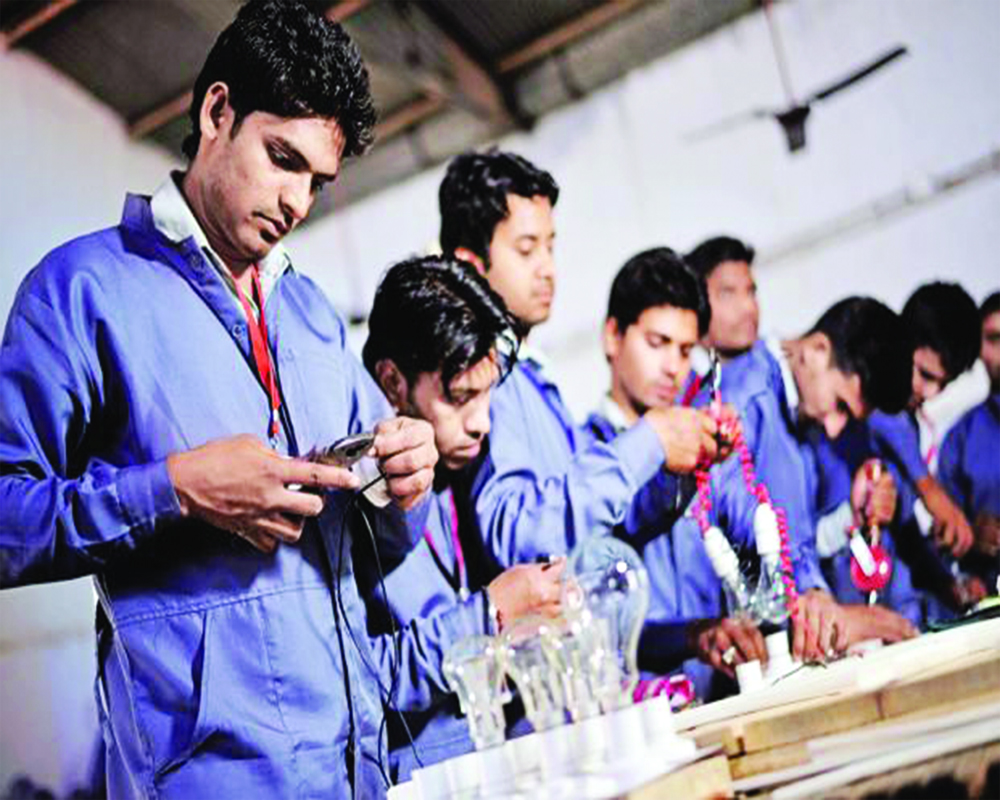Engaging with research organisations and academic institutions that focus on education, skills, and labour markets is critical to building capability
Addressing the challenge of skilling millions of new entrants of the working age is crucial in India's economy, which is undergoing structural, demographic, and technological shifts. As the nature of work changes, it is essential to make new entrants employable and skilled, which is a big challenge. By 2024, around 70 million new individuals within the working age bracket, i.e., 15-59 years, are expected to enter India's labour force. The estimated total workforce will then be around 405 million people. The recently released Periodic Labour Force Survey (PLFS) annual report, 2022-23, reveals that this will include 59 million youth aged between 15-30 years. Hence, strategies for re-skilling, up-skilling, and recognising informally acquired skills of the current workforce must be reinforced.
India is taking unique initiatives to leverage its demographic potential into a dividend that will fuel the country's growth. Simultaneously, ageing populations in several developed countries provide opportunities for skilled individuals' migration from India to benefit both the host and destination countries. According to an analysis, India's labour force above 30 years of age is 262 million people. Out of this, 259 million are currently employed and need to be future-ready. The National Skill Development Corporation (NSDC) was established as a public-private partnership (PPP) to encourage private sector participation in India's skill development sector to drive re-skilling and up-skilling initiatives. This will help prepare the workforce for new technologies and the future of work.
Three major challenges in skill development
Firstly, there should be collaboration between industry and the private sector. This is an essential strategic pillar for India, as it is necessary to create avenues for private-sector engagement. Skill development faces several forms of market failures, including information asymmetries. A skilled person knows their skills, but a potential employer does not. If employers had all the information, they would be willing to pay more for a skilled person. Recognition of Prior Learning (RPL) is an intervention to address information asymmetry.
There is a vast segment of informal workers in India, many of whom possess skills that have not been formally recognised. RPL interventions are critical in this scenario, as holding a formal certification can improve an individual's bargaining power. Some analysis reveals that the monthly incomes of RPL-certified individuals were on average 19% higher than those who had not been RPL-certified. An average increase of 25% in income after certification was reported.
Another market failure in skill development is externalities. When a firm spends resources on developing the skills of an employee, he or she can quit and join another firm, thus benefiting the latter firm and not the firm that incurred the training cost. Government intervention is necessary where there are such market failures. Workers are incentivised to invest in their general skill training through apprenticeships or self-paid training, as they can benefit from higher salaries when they switch jobs. As such, firms may be willing to spend on developing specific skills of employees. There are various skill development models, including government-funded programs that fully or partially subsidize training/apprenticeships, market-led, market-led, and industry-led/on-the-job training.
Collaboration with industry is fundamental to ensure the relevance and quality of skills training and for building the institutional structures required to achieve the desired outcomes. Sector Skill Councils (SSCs) were incubated by the National Skill Development Corporation (NSDC) to foster industry connections and develop an industry-relevant course and curriculum.
Secondly, there should be encouragement for international mobility. India is committed to becoming the "skill capital" of the world, and the India International Skill Centre (IISC) programme is evidence of this. A new, market-driven IISC network has been proposed to counsel and guide potential emigrants, focusing on skills tests, up-skilling, language, and pre-departure orientation. Furthermore, the governments of India and Japan are cooperating to implement Japan's Technical Intern Training Programme (TITP), an on-the-job training scheme providing three to five years of internship opportunities for foreign nationals in Japan, with NSDC as the implementing organisation.
Technical collaborations have been undertaken with countries such as the UK, Australia, and the UAE for benchmarking and mutual recognition of standards. Government-to-government and B2B partnerships are also being developed for new markets such as those in Western Europe, Canada, Australia, and East Asia to increase the mobility of blue and white-collar Indian workers. Thirdly, improving women's participation in the labour force is a significant challenge in India. Out of the country’s total labour force of 395.2 million, only 91.6 million are women. To address this issue, skilling initiatives can be implemented along with a wider push towards gender sensitisation, creating economic opportunities, and providing social support.
We can use residential facilities for women trainees and embed mentoring and coaching in skills programs to improve their participation. Local workshops can also be organised to provide social support. To make employment more attractive to women, they can be prepared for forms of work such as the gig economy, which has more flexible work models. This is especially relevant because 229.2 million women out of the 301.5 million who are not in the labour force report their status as "attending domestic duties."
Fortunately, our progress in creating access to skill development for women in the beauty- wellness and health sectors has been positive. More than 60% of the candidates trained under PMKVY are women. Several training providers focus exclusively on women and promote skill training in towns and rural areas. Partnerships with industries to support women-centric projects in non-traditional trades have also been explored. Engaging with research organisations, academic institutions, think tanks, and multilateral institutions that focus on education, skills, and labour markets is critical to building new initiatives, collaborations, and institutional knowledge and capability.
(The writer is a co-founder and MD of Orane International, a Training Partner with the National Skill Development Corporation (NSDC), and a Network Member of India International Skill; views are personal)


























